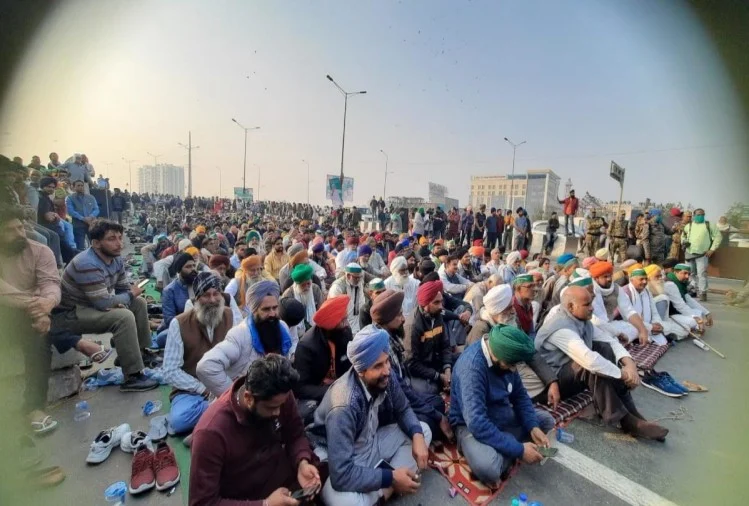
After the New Agricultural Laws, farmers are afraid of not getting a fair price for their produce, then agricultural experts are telling how apprehensive the farmers are. Read the report of Manish Mishra before the talks between the government and farmers on Tuesday.
1. Agricultural Produce Trade and Commerce (Promotion and Facilitation) Act – 2020 Government: Farmers can sell produce wherever they want.
Competition will increase and farmers will get better prices. A large market will be found outside the Agricultural Produce Marketing Committee (APMC). Farmers can sell produce wherever they want. More than a thousand mandis have been added online. More than one lakh business has been done in them. There is no restriction on the MSP to sell the produce. The government gave the MSP one and a half times the cost, as per the Swaminathan Committee report. Earlier there was MSP on few crops, now the number has been increased.
Farmer Will be like free data
In Bihar, the APMC Act was abolished in 2006, the situation there is worse than bad. There the MSP sells the produce at half the rate. If you give something in the beginning, then later the problem increases. For example, some companies, such as giving Net data for free, later increased the rates. In such a situation, those who came to the port and wanted to go to the old companies, by then the old shops were closed. The farmer will be in a similar situation. There will be no mandis nor FCI will survive.
Rajinder Singh, farmer, Karnal Agricultural experts , there are already private mandis in Maharashtra, there is no price available….
Farmers are being led astray. We are allowing the sale of agricultural produce outside the market. If outside companies come, how will they pay? There are already private mandis in Maharashtra, the price is not available there. MSP is not available on cotton. Is selling below The government gets the price of the thing which starts increasing and the price goes down.
– Vijay Jawandia, farmer leader and expert
corporate, small farmers will be out when small corporate will come out. The farmer understands this. If you take the example of the US, 93% of dairy farms have been closed since the 1970s. Yet milk production in the US has increased. Because a corporate entry has been done. The same situation will happen in India, because we have brought these models from there. This is why the corporate will benefit. – Devinder Sharma, Agricultural Economist
Farmers should be scared… not to become a puppet of the corporate
2. Farmers (Empowerment and Protection) Price Assurance Agreement and Agreements on Agricultural Services Act -2020
Government: will eliminate the intermediaries of brokers and brokers
by contracting farmers directly with companies Will get Which will give better value of their produce. The middlemen of brokers and agents will end, if the crop goes bad, the company cannot end the contract. But the farmer will have the right to break the agreement. If the company’s profit is high, then it will have to pay a separate bonus to the farmers. Now the risk will not be of the farmer but of the company.
Farmer: Fear of grain crisis
Contract farming has been taking place in the country for a long time. The company gives its expensive seeds to fertilizers and also gives guidelines. The farmer runs towards cash crops. The company comes to farming on its own, so that the food crisis does not escalate. The cost is high. The seeds themselves will also be gone. Does not buy on the basis of quality.
The company tantrums to buy it, it has to be delivered in the same quality. In Punjab, if the company did not buy the goods of the farmers, it had to be sent to the open market. Contract farming is done in the whole village of the whole village. A food crisis may come in the village, only one kind of crops will start.
– Sonu Sharma farmer, Mangrauli, Bulandshahr
agriculture experts have
failed the contract farming
Vijay Jawandia, farmer leader and expert
Contract farming started in the year 1986 in Punjab itself. The Pepsi-Cola Company cultivated potatoes and vegetables from farmers. Later, he started bringing quality. The quality of the crop depends on the season. Similarly, when Basmati rice started breaking in Punjab, the company refused to take the goods. The government says that companies cannot pledge land, but how will revenue officials decide for the benefit of farmers.
Farmer wants fixed price
Devendra Sharma, Agricultural Economist-
First of all, people in Punjab pulled out of contract farming, just give us the MSP, make the purchase illegal under it. Farmers all over the world are troubled by the fluctuations of the market. The farmer wants a fixed price. Today the farmer needs direct support. Now the farmer should have Rs 18000 per month. PM Kisan Nidhi’s plan has been demanding before the farmers come and hand them over to the market. Can the salary package of economists and bureaucrats also be linked with the market? If the market is so good then what is the problem with them? The farmer will also have no problem.
3. The rationale of the Essential Commodities (Amendment) Act -2020
Investment will increase, farmers will benefit
Surplus Due to the surplus of agricultural products and reduced investment in cold storage, warehouses, processing units and exports, farmers are not able to get better prices. With the removal of the stock limit, this further disinvestment of private sector will increase and farmers consumers will get benefited from it. The time has come for Brand India to establish itself with a reputation in any of the world’s markets. Farmers can also be part of the value chain of biscuits, chips, jam and other consumer products.
The farmer says: who will buy our goods?
We will do capital stock in it, take it from where it is cheaper. Who will buy the farmer’s goods by importing cheaper and selling cheaper? The farmer will have to sell more cheaply. In a way, we will control the market. The market rate will be decided on the gestures of private companies. Adulteration will also increase; Aarti is still decreasing. When big people come, then you are not in control at all.
– Sumit Chhikara, farmer, Kanoda, Jhajjar, Haryana If the companies import
agricultural experts
the farmer will die
Vijay Jawandia, farmer leader and expert-
There is a provision that the government will interfere if the price of cereals increases by 50 percent and vegetable and fruits will increase by 100 percent, but the oilseeds pulses will increase by more than 50 percent. Price should not be less than MSP. Now when prices started rising in the market, the government started importing, whereas it does not happen in foreign countries. If the private company comes, then the pulses mill will need to be collected throughout the year, then it will keep it collected.
They will be hurt if they buy new from the farmers, if they are exported, then they will kill the consumer. If the company is buying for export, then the law will not apply. When Joe will keep the stock. He will remove it and drop the price in the market at the time of harvest, and then stock it, how will the government control it?
You can stock as much as you want
Devinder Sharma, Agricultural Economist-
When there is no stock limit, then stock as much as you want. The consumer will not suffer that much because when prices rise, the government imports and opens shops. What did the government do when it was cheaper? What did the government do when the farmer throws his produce on the roads? What did private players do?







